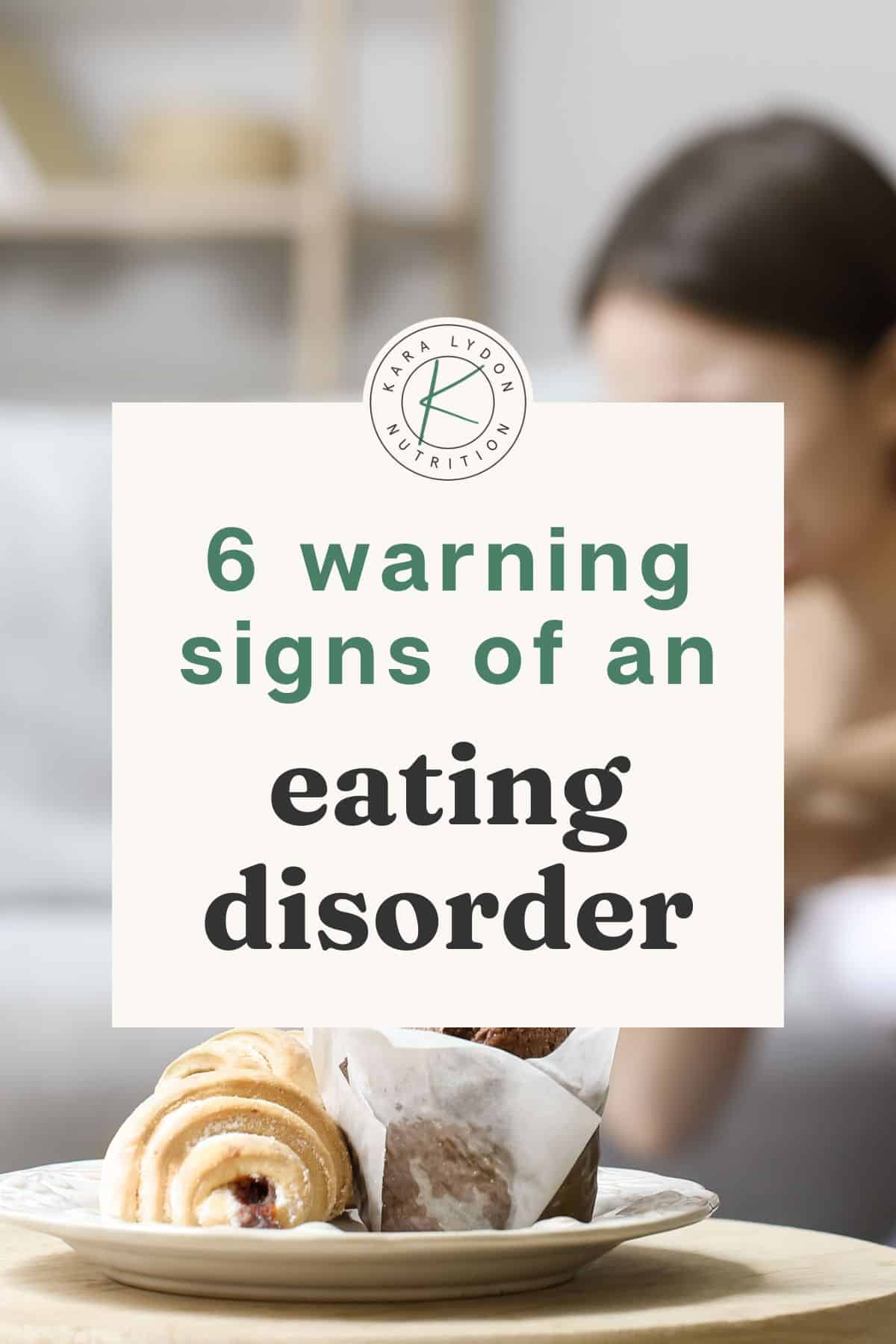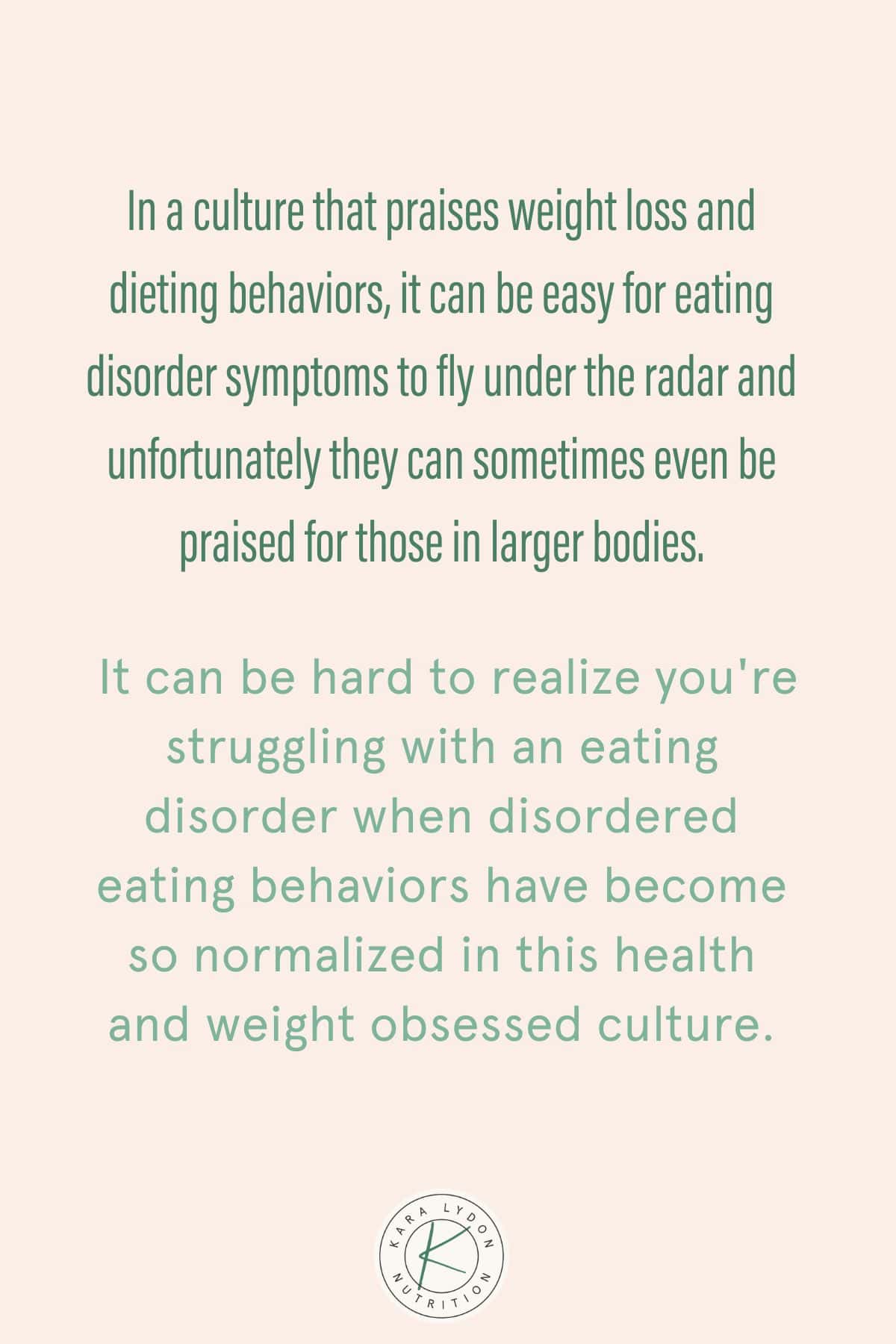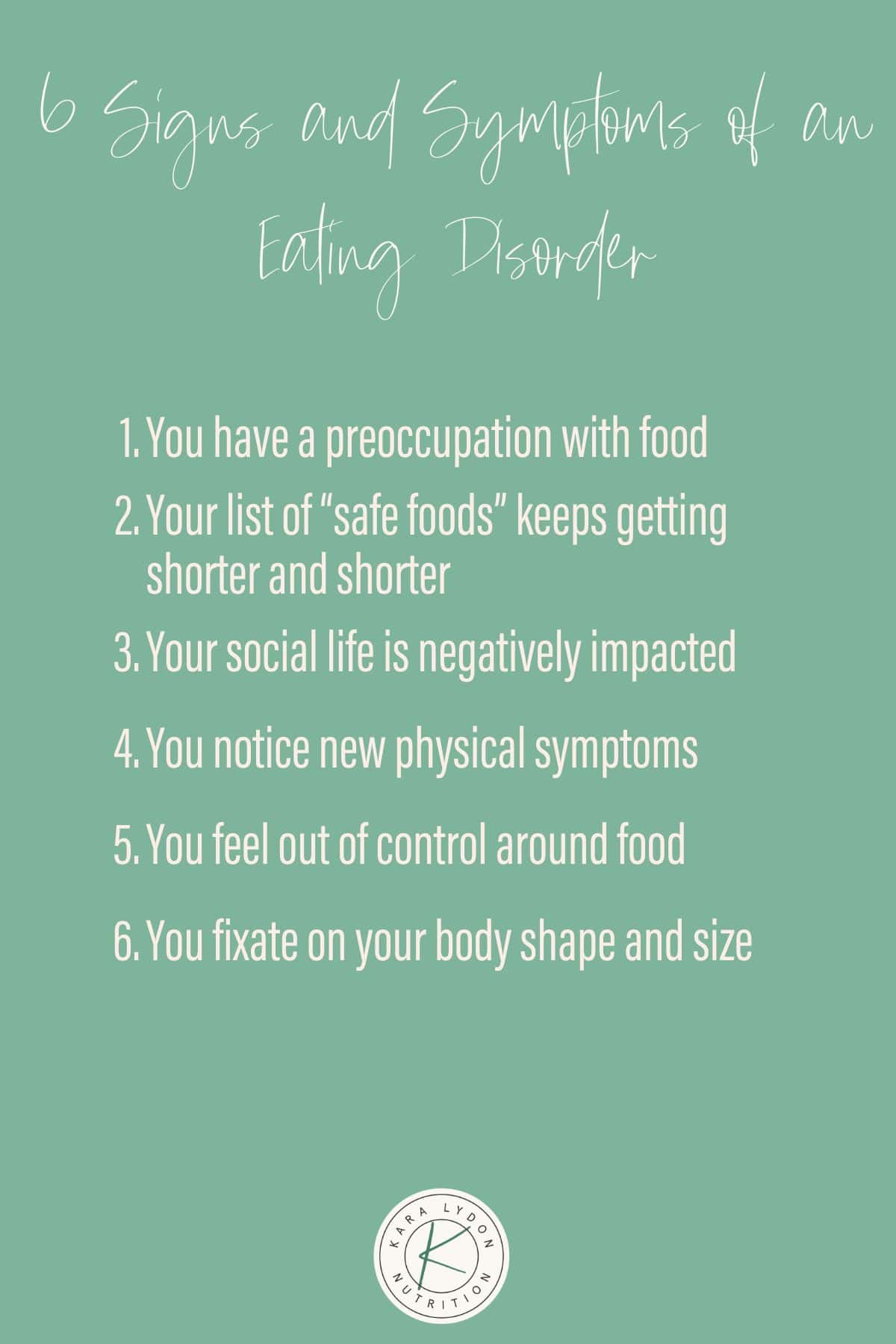6 Warning Signs of an Eating Disorder Leave a comment
Concerned you might have an eating disorder but aren’t sure? Read these 6 signs and symptoms of eating disorders to see if any resonate with you.
As a dietitian who specializes in the treatment of eating disorders, all too often I see folks missing the warning signs that their once seemingly harmless dieting behaviors are becoming out of control.
In a culture that praises weight loss and dieting behaviors, it can be easy for eating disorder symptoms to fly under the radar and unfortunately they can sometimes even be praised for those in larger bodies. It can be hard to realize you’re struggling with an eating disorder when disordered eating behaviors have become so normalized in this health and weight obsessed culture.
While this post is for educational purposes only and not intended to diagnose and is not a substitution for individualized medical, nutrition, or mental health advice, I do hope that it gives you some insight to help guide you toward seeking out a provider who can provide your with a diagnosis or more importantly, the care and support you deserve. You deserve to have a healthy relationship with food.
What is an eating disorder?
An eating disorder is a biopsychosocial disorder, meaning it’s influenced by biology (genetics), personality traits (often seen alongside other mental illness like anxiety or PTSD), and sociocultural factors like anti-fat bias. There are several types of eating disorders including:
Anorexia Nervosa
Bulimia Nervosa
Binge Eating Disorder
Other specified eating disorder
Avoidant / Restrictive Food Intake Disorder (ARFID)
Rumination Disorder
Pica
Orthorexia
Signs and symptoms of an eating disorder
1.You have a preoccupation with food
I always ask my clients to envision a pie chart that encompasses all the thoughts they have over the course of the day and then ask if they were to shade in the portion of their thoughts that comprise food, weight, and health, what percentage would they be shading?
While there’s no exact threshold here, it is telling to hear the answer. My clients who say oh it’s all consuming or definitely the majority, 75% or higher, usually have an eating disorder or disordered eating.
If you find yourself obsessing over food choices and feel like you’re constantly thinking about and stressing about food and don’t have the mental bandwidth for much else, you deserve more support.
2. Your list of “safe foods” keeps getting shorter and shorter.
Folks with eating disorders often find themselves avoiding many foods or a particular food group like carbohydrates or fats, putting them at risk for nutritional deficiencies. Typically, if a “fear food” is consumed, they will feel significant distress and experience intense guilt or shame.
3. Your social life is negatively impacted.
Do you avoid certain food situations or do they cause significant distress? Folks with eating disorders often have a hard time eating out at restaurants and traveling, and may skip out on social events or get togethers with friends that revolve around food.
4. You notice new physical symptoms.
You might notice one or many of the following symptoms: dramatic fluctuations in weight, amenorrhea (or loss of menstrual cycle), feeling cold, development of lanugo or fine hair on body, dry skin, dizziness, weakness, fatigue, changes in blood pressure, gastrointestinal distress, hair loss, and trouble sleeping.
This is not an exhaustive list by any means but these are some common physical symptoms to be on the lookout for. You may also want to read my blog post on signs you are undereating.
5. You feel out of control around food.
My clients often will say they feel like they can’t trust themselves around food and feel out of control around certain trigger foods. Once they start eating a certain food, they are unable to stop and eat to the point of significant discomfort, sometimes not even feeling present for the experience.
Afterwards, they’ll report feeling intense guilt or shame and may try to engage in a compensatory behavior like purging, overexercising, or restricting the next day. They may also engage in eating in secret or hiding or hoarding food.
6. You fixate on your body shape and size.
Folks with eating disorders are often significantly dissatisfied with their body’s appearance and engage in body checking behaviors frequently such as spending time looking at their body in the mirror, weighing themselves, comparing their body to other’s, or pinching different areas of their body.
What to do if you suspect you have an eating disorder
If you suspect you might have an eating disorder or disordered eating, you deserve treatment, support and care. You shouldn’t suffer alone.
Reach out to a registered dietitian, therapist, or PCP that specializes in the treatment of eating disorders to see if you meet the criteria for an eating disorder. And even if you don’t (there are issues with the diagnostic criteria), you still deserve support if this is negatively impacting your quality of life. Full stop.
Our private practice specializes in the treatment of eating disorders and all of our registered dietitians are weight-inclusive and trauma-informed. Learn more about nutrition counseling and and book your nutrition assessment today.
For more eating disorder resources:
National Alliance for Eating Disorders
Project Heal
Academy for Eating Disorders
Fed Up Collective
National Association of Anorexia Nervosa and Associated Disorders
Association for Size Diversity and Health
National Association to Advance Fat Acceptance
For more blog posts like this check out:
Am I Eating Enough? 8 Signs You’re Undereating
What is the hunger fullness scale?
Best Body Image Books
Am I Hungry? Signs of Hunger to Watch For
The Science on Dieting and Weight Loss



